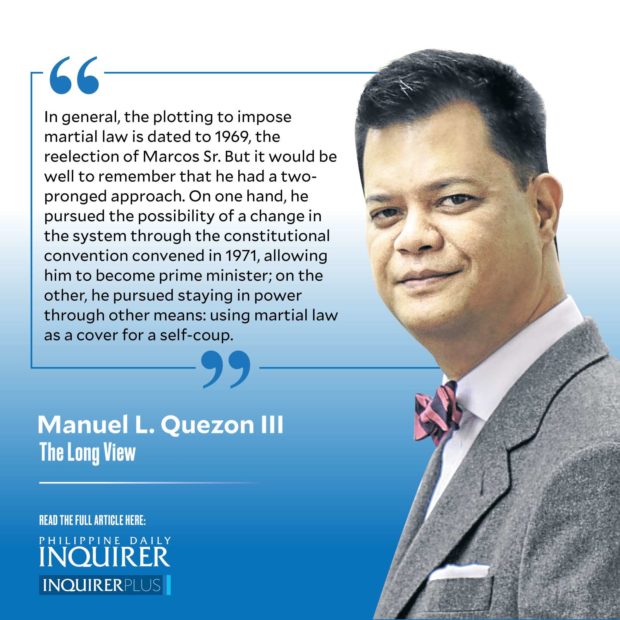Revisiting ML: Means, motive, opportunity (1)
(First of three parts)
Valuable, valiant efforts are being made to ensure the 50th anniversary of the proclamation of martial law is marked not with celebration, but with sober reflection. On Sept. 23, the UP Third World Studies Center will be launching www.diktadura.upd.edu.ph as an accompaniment to a book they’re publishing. Historians Patricio Abinales and Leia Castañeda Anastacio have edited an anthology to be published by the Ateneo de Manila University Press, quite possibly within the same time frame. In my own www.philippinediaryproject.com, I am trying to complete uploading the 1972-1973 diary entries of President Marcos Sr. Reading his entries in tandem with the 1972-1973 Constitutional Convention diary of delegate Augusto Caesar Espiritu, and Dante Vizmanos gives the reader a front-row seat into the thinking of Right, Center, and Left in that era.
There is, of course, a standard narrative for Marcos loyalists: that the president imposed martial law after a combined communist-oligarch plot to subvert the Republic brought the country to the brink of anarchy from the First Quarter Storm onwards. The countervailing narrative was that after bringing the country to the brink of fiscal collapse to ensure his reelection in 1969, Marcos Sr. then engineered a coup to replace democratic government with a dictatorship. One he disguised as “constitutional authoritarianism” to make himself president-for-life before his term expired in 1973.
What tips the balance in favor of one of these interpretations is not that a dictatorship was established, or that it used state violence to defend the state, but rather, the ultimate goal both served: familial control over the state, which inevitably meant that corruption became the defining characteristic of the dictatorship. It was this corruption that, in the end, edged aside all the other supposed objectives of, or justifications for, the regime, and which sapped the vitality of the regime so that it proved incapable of understanding, much less countering, the public outrage that built up in response to its abuses, and so, toppled it.
In general, the plotting to impose martial law is dated to 1969, the reelection of Marcos Sr. But it would be well to remember that he had a two-pronged approach. On one hand, he pursued the possibility of a change in the system through the constitutional convention convened in 1971, allowing him to become prime minister; on the other, he pursued staying in power through other means: using martial law as a cover for a self-coup. Of these, what materialized first—the first means, given his motive, and his looking for opportunity—was self-perpetuation by means of a convention.
Here, I believe the first consideration is that the time frame must move back to at least 1967, because of (up to now) a unique political development. In that year, for the first time, a plebiscite proposal was rejected by the electorate when they voted “No” to Congress’ proposals to expand the number of seats in the House of Representatives and to allow members of Congress to sit as constitutional convention delegates without losing their seats (allowing them to run in the convention election scheduled for November 1970). The failure of the proposal meant that the forthcoming convention would be anybody’s ball game, but leaning toward an incumbent president, acting as an interested party, being able to influence the composition of the convention more than if established congressional figures could also sit as delegates. It provided an opportunity for Marcos Sr. to nudge amendments toward a shift to the parliamentary system to enable him to escape constitutional term limits.
Did the convention fail, as a Plan A, or was it always a Plan B, requiring martial law as a Plan A for the convention—and its output—to finally be whipped into shape? Which is how things turned out. Or did the convention as Plan A falter, when tensions caused by Marcos Sr. going-for-broke to secure reelection, fractured the economy, leading to social tensions that whetted the appetite of the Left and Right for political brinkmanship?
Here, the Original Sin becomes Marcos Sr. creating the circumstances that suddenly raised the ante for everyone: himself, the traditional political players, and the new radicals, all of whom, recent scholarship by people like Joseph Scalice has shown, were to one degree or another, all allied with each other at one point or another, during the time. In other words, all sides are both perpetrators and victims in a case of national assisted suicide.
This raises a question deserving investigation: was there an awareness before, or only after, brinkmanship—incendiary political rhetoric, terrorism— started defining our politics, that there existed a characteristic of our society shared by Right, Left, or Center: the belief that society should, and can, be remade practically overnight if only some sort of superhuman will can be summoned and through it, change imposed on a society and its members.
Because then all sides have a shared motive: the replacement of the existing democratic system with another, with at least two (Marcos and the radical Left), it seems, fixated on some sort of dictatorship being that system (though at least some in the Middle viewed dictatorship as necessary, too: just not by Marcos Sr.). Where they diverge is the means: the radicals explored terrorism; Marcos Sr. explored a coup; the middle, perhaps more muddle-headed, was willing to also go where terrorism might lead, if only to ensure an election in 1973 that might pull back society from the brink, in time—without Marcos Sr.
But when would the right opportunity present itself?
Email: mlquezon3@gmail.com; Twitter: @mlq3




















